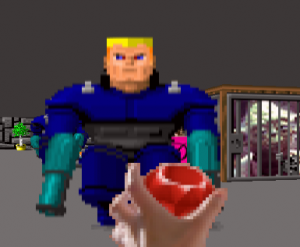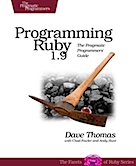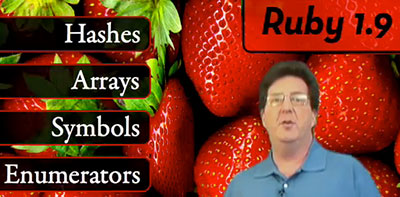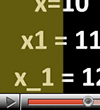
RailsWayCon – Berlin, Germany, May 25-27, 2009
Overview: RailsWayCon is, in many ways, a logical replacement for RailsConf Europe this year. Taking place in Berlin, as RailsConf Europe did, there’s a wide range of well known Ruby and Rails faces attending and a significant number of sessions organized into three tracks.
Well-known attendees/speakers: Amy Hoy, Yehuda Katz, Neal Ford, Thomas Fuchs, Michael Koziarski, Steven Bristol, Ola Bini, Stefan Tilkov, Jonathan Weiss
Registration: You can buy a ticket to the main conference for €699 for both days or €349 for a single day. Freelancers and students get significant discounts. Click on “Registration” on the official site to learn more. Read More


 At
At  Whether you love it or not, as a Rubyist you probably have a copy of Programming Ruby (also known as The Pickaxe) floating about. It was the first English language Ruby book to be published and was instrumental in boosting Ruby’s popularity in the early noughties.
Whether you love it or not, as a Rubyist you probably have a copy of Programming Ruby (also known as The Pickaxe) floating about. It was the first English language Ruby book to be published and was instrumental in boosting Ruby’s popularity in the early noughties. Update: I retract the post Be Professional or Be Edgy: How Context Can Keep Everyone Happy of April 27, 2009 in full. It covered an issue that started as a Ruby-related thing, but quickly became focused on the behavior and sentiments of some Rails communities. Ruby Inside is a Ruby news blog; therefore my editorial was unuseful and made for dull reading. I apologize for falling into such boring territory.
Update: I retract the post Be Professional or Be Edgy: How Context Can Keep Everyone Happy of April 27, 2009 in full. It covered an issue that started as a Ruby-related thing, but quickly became focused on the behavior and sentiments of some Rails communities. Ruby Inside is a Ruby news blog; therefore my editorial was unuseful and made for dull reading. I apologize for falling into such boring territory.
 It’s been just over a year since
It’s been just over a year since  Following on from our news about the new version of RubyGems and its plugin functionality, Gabriel Horner has put together
Following on from our news about the new version of RubyGems and its plugin functionality, Gabriel Horner has put together 
 Version 1.3.2 not only has a bunch of bug fixes (including supporting https URLs for gem sources) and improvements, but a number of
Version 1.3.2 not only has a bunch of bug fixes (including supporting https URLs for gem sources) and improvements, but a number of 
